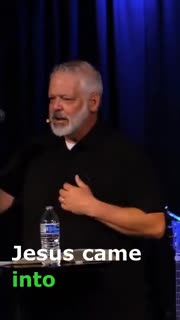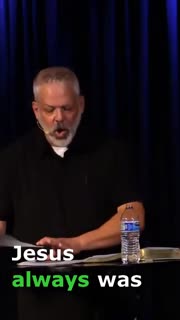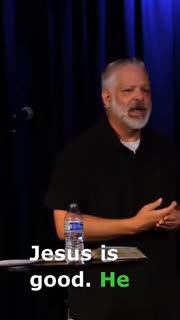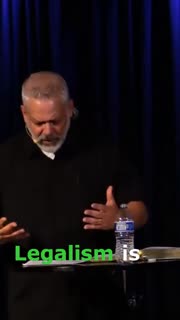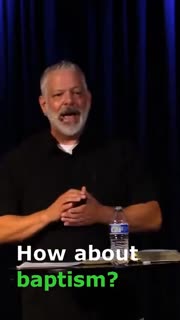Inner Purity: Challenging Traditions in Faith
Summary
### Summary
Today, we embarked on a new series titled "Ask the Rabbi," focusing on the unconventional ways Jesus, our Rabbi, taught His disciples and responded to questions. Unlike traditional rabbis, Jesus chose His disciples from among the unschooled and unlearned, emphasizing that His teachings were accessible to all. We explored a specific encounter in Mark 7 where the Pharisees questioned Jesus about His disciples not following the traditions of the elders, particularly regarding ceremonial handwashing. Jesus used this opportunity to challenge the Pharisees' adherence to human traditions over God's commands, highlighting the importance of inner purity over external rituals.
Traditions, while not inherently bad, can sometimes overshadow the true essence of God's commands. Jesus emphasized that what defiles a person comes from within—evil intentions, pride, and other sins—not from external factors like unwashed hands. This teaching was revolutionary, turning the religious norms of the time on their head. We also discussed how traditions can become legalistic, adding unnecessary burdens and veiling the true commands of God.
To avoid falling into the same trap as the Pharisees, we must ask ourselves four critical questions: Is it a command or a tradition? Is it a truth or a tradition? Is it a guardrail or a tradition? Is it a preference or a tradition? By discerning these, we can ensure that our faith remains rooted in God's Word and not in human-made traditions.
We concluded by reflecting on the sacred practices of baptism and communion, emphasizing that these should never become mere traditions but should always be heartfelt spiritual experiences. Communion, in particular, is a profound reminder of Jesus' sacrifice and should be approached with reverence and gratitude.
### Key Takeaways
1. Inner Purity Over External Rituals: Jesus taught that what defiles a person comes from within, not from external actions like unwashed hands. This challenges us to focus on the condition of our hearts rather than merely adhering to outward rituals. True purity is a matter of the heart, where evil intentions, pride, and other sins reside. [36:19]
2. Questioning Traditions: Traditions can be beneficial, but they should never overshadow God's commands. Jesus criticized the Pharisees for prioritizing human traditions over divine commands. We must continually evaluate whether our practices align with God's Word or if they are merely human traditions that need to be reconsidered. [35:23]
3. Guardrails vs. Legalism: God provides guardrails through His Word to protect us, but adding to these guardrails can lead to legalism. Legalism occurs when we impose human-made rules that Jesus or the Scriptures do not command. Understanding the difference between God's guardrails and human traditions helps us live in true freedom. [56:03]
4. The Role of Preferences: Preferences in worship styles, preaching methods, and church practices should not become divisive traditions. While different churches may have various styles and methods, the core message of the gospel remains the same. We should celebrate diversity in the body of Christ and avoid letting preferences become stumbling blocks. [57:43]
5. Sacred Practices with Heartfelt Reverence: Baptism and communion are sacred practices instituted by Jesus. These should never become mere traditions but should always be approached with heartfelt reverence. Communion, in particular, is a profound reminder of Jesus' sacrifice and should be a spiritual experience that deepens our faith and gratitude. [01:02:20]
### YouTube Chapters
[0:00] - Welcome
[23:04] - Introduction and Announcements
[24:29] - Opening Prayer
[25:46] - New Series: Ask the Rabbi
[27:19] - The Importance of Questions
[29:14] - Traditions and Their Impact
[33:41] - Jesus' Encounter with the Pharisees
[36:19] - Inner Purity Over External Rituals
[39:20] - Apostle Paul's Warning on Traditions
[41:17] - The Little Pharisee in All of Us
[42:14] - Command or Tradition?
[45:31] - Truth or Tradition?
[50:49] - Guardrail or Tradition?
[57:43] - Preference or Tradition?
[01:02:20] - Communion: A Sacred Practice
[01:09:39] - Taking the Cup
[01:10:45] - Closing Blessing
Study Guide
### Bible Reading
1. Mark 7:1-23 - Jesus' encounter with the Pharisees about traditions and inner purity.
2. Psalm 19:8 - "The precepts of the Lord are right, giving joy to the heart. The commands of the Lord are radiant, giving light to the eyes."
3. 1 Corinthians 4:5-7 - Paul's warning about going beyond what is written and the importance of motives.
### Observation Questions
1. What specific traditions were the Pharisees concerned about in Mark 7, and how did Jesus respond to their concerns? ([34:27])
2. According to Jesus in Mark 7, what truly defiles a person? ([36:19])
3. How does Psalm 19:8 describe the commands of the Lord, and what impact do they have on a person?
4. In 1 Corinthians 4:5-7, what does Paul say about judging before the appointed time and the importance of not going beyond what is written?
### Interpretation Questions
1. Why did Jesus emphasize inner purity over external rituals in His response to the Pharisees? How does this challenge the religious norms of His time? ([36:19])
2. How can traditions become legalistic and overshadow the true essence of God's commands, according to the sermon? ([35:23])
3. What does Paul mean by "do not go beyond what is written" in 1 Corinthians 4:6, and how can this principle be applied to modern church practices? ([40:24])
4. How does the concept of guardrails versus legalism help us understand the balance between following God's commands and avoiding human-made rules? ([56:03])
### Application Questions
1. Reflect on your own life: Are there any traditions or rituals you follow that might be overshadowing the true essence of God's commands? How can you refocus on inner purity? ([36:19])
2. Think about a time when you prioritized a human tradition over a command of God. How did it affect your spiritual life, and what steps can you take to realign your practices with God's Word? ([35:23])
3. In what ways can you ensure that your preferences in worship styles, preaching methods, or church practices do not become divisive traditions? How can you celebrate diversity within the body of Christ? ([57:43])
4. How can you discern whether a practice in your church is a command, a truth, a guardrail, or a tradition? What steps can you take to avoid legalism and live in true freedom? ([42:14])
5. Reflect on the sacred practices of baptism and communion in your life. How can you approach these with heartfelt reverence and ensure they remain profound spiritual experiences rather than mere traditions? ([01:02:20])
6. Identify one area in your life where you might be adding unnecessary burdens through legalistic practices. How can you simplify your faith to focus more on God's commands and less on human traditions? ([56:03])
7. How can you apply the principle of "not going beyond what is written" in your daily walk with God? What practical steps can you take to ensure your beliefs and practices are rooted in Scripture? ([40:24])
Devotional
### Day 1: Inner Purity Over External Rituals
Jesus taught that what defiles a person comes from within, not from external actions like unwashed hands. This challenges us to focus on the condition of our hearts rather than merely adhering to outward rituals. True purity is a matter of the heart, where evil intentions, pride, and other sins reside. Jesus' encounter with the Pharisees in Mark 7 highlights this truth. The Pharisees were more concerned with ceremonial handwashing than with the state of their hearts. Jesus used this opportunity to emphasize that inner purity is far more important than external rituals.
We must examine our own lives to see if we are prioritizing external actions over the condition of our hearts. Are we more concerned with how we appear to others than with our inner spiritual health? Jesus calls us to focus on inner purity, which involves a deep, honest examination of our thoughts, intentions, and attitudes. By doing so, we align ourselves more closely with God's commands and experience true spiritual transformation. [36:19]
Mark 7:20-23 (ESV): "And he said, 'What comes out of a person is what defiles him. For from within, out of the heart of man, come evil thoughts, sexual immorality, theft, murder, adultery, coveting, wickedness, deceit, sensuality, envy, slander, pride, foolishness. All these evil things come from within, and they defile a person.'"
Reflection: What are some areas in your life where you focus more on external appearances than on the condition of your heart? How can you shift your focus to inner purity today?
### Day 2: Questioning Traditions
Traditions can be beneficial, but they should never overshadow God's commands. Jesus criticized the Pharisees for prioritizing human traditions over divine commands. We must continually evaluate whether our practices align with God's Word or if they are merely human traditions that need to be reconsidered. Traditions can sometimes become so ingrained that we follow them without questioning their relevance or alignment with Scripture.
Jesus' response to the Pharisees in Mark 7 serves as a reminder to us to question our traditions. Are they helping us grow closer to God, or are they merely human customs that have lost their spiritual significance? By asking ourselves these questions, we can ensure that our faith practices are rooted in God's Word and not in human traditions. [35:23]
Colossians 2:8 (ESV): "See to it that no one takes you captive by philosophy and empty deceit, according to human tradition, according to the elemental spirits of the world, and not according to Christ."
Reflection: Think about a tradition you follow in your spiritual life. Does it align with God's Word, or is it a human tradition that needs to be reconsidered? How can you ensure that your practices are rooted in Scripture?
### Day 3: Guardrails vs. Legalism
God provides guardrails through His Word to protect us, but adding to these guardrails can lead to legalism. Legalism occurs when we impose human-made rules that Jesus or the Scriptures do not command. Understanding the difference between God's guardrails and human traditions helps us live in true freedom. Legalism can create unnecessary burdens and distract us from the true essence of God's commands.
Jesus' teachings challenge us to distinguish between God's guardrails and human traditions. By doing so, we can avoid the trap of legalism and experience the freedom that comes from living according to God's Word. This involves a careful examination of our beliefs and practices to ensure that they are not adding unnecessary burdens to our spiritual lives. [56:03]
Galatians 5:1 (ESV): "For freedom Christ has set us free; stand firm therefore, and do not submit again to a yoke of slavery."
Reflection: Are there any human-made rules or traditions in your life that have become burdensome? How can you distinguish between God's guardrails and legalistic practices to experience true freedom in Christ?
### Day 4: The Role of Preferences
Preferences in worship styles, preaching methods, and church practices should not become divisive traditions. While different churches may have various styles and methods, the core message of the gospel remains the same. We should celebrate diversity in the body of Christ and avoid letting preferences become stumbling blocks. Preferences can sometimes lead to division if we elevate them above the essential truths of the gospel.
Jesus' teachings remind us to focus on the core message of the gospel rather than on our personal preferences. By doing so, we can foster unity within the body of Christ and celebrate the diversity of worship styles and practices. This involves recognizing that while our preferences may be important to us, they should not become barriers to fellowship and unity with other believers. [57:43]
Romans 14:1-3 (ESV): "As for the one who is weak in faith, welcome him, but not to quarrel over opinions. One person believes he may eat anything, while the weak person eats only vegetables. Let not the one who eats despise the one who abstains, and let not the one who abstains pass judgment on the one who eats, for God has welcomed him."
Reflection: Think about a preference you have in worship or church practices. How can you ensure that this preference does not become a stumbling block or cause division within the body of Christ?
### Day 5: Sacred Practices with Heartfelt Reverence
Baptism and communion are sacred practices instituted by Jesus. These should never become mere traditions but should always be approached with heartfelt reverence. Communion, in particular, is a profound reminder of Jesus' sacrifice and should be a spiritual experience that deepens our faith and gratitude. These sacred practices are meant to draw us closer to God and remind us of His love and sacrifice.
Jesus' institution of baptism and communion calls us to approach these practices with reverence and gratitude. By doing so, we can experience their full spiritual significance and allow them to deepen our faith. This involves taking time to reflect on the meaning of these practices and approaching them with a heart full of reverence and gratitude. [01:02:20]
1 Corinthians 11:27-29 (ESV): "Whoever, therefore, eats the bread or drinks the cup of the Lord in an unworthy manner will be guilty concerning the body and blood of the Lord. Let a person examine himself, then, and so eat of the bread and drink of the cup. For anyone who eats and drinks without discerning the body eats and drinks judgment on himself."
Reflection: How can you approach the practices of baptism and communion with greater reverence and gratitude? What steps can you take to ensure that these practices remain spiritually significant in your life?
Quotes
### Quotes for Outreach
1. "Jesus came into a world that was in chaos. He came into a world where His own people, the Jews, were under the thumb of the Romans, under the thumb of the Roman empire. And the Jewish people were longing for their Messiah. They were longing for their Messiah, but they did not realize Jesus was their Messiah because they were looking for David 2.0, a king, a Messiah who was going to come as a general with military might and make the kingdom of Israel thrive again and drive out the Romans. That's what they expected. That's not how Jesus came, right?" (42 seconds)
2. "Jesus always was asking, what's behind the command? He does that in the Sermon on the Mount and many other places. What's behind the command? The commands of God are good. What's behind it? The Apostle Paul, who wrote two-thirds of the New Testament, who was a Pharisee himself, a law-abiding, good Jewish Pharisee, thought he was doing God a favor by killing these Christians who followed the way of Jesus. Well, just like Jesus, he takes an enemy and turns that enemy into his mouthpiece to go take the gospel to the ends of the known world at the time." (42 seconds)
3. "Jesus is good. He says, the new commands were to love. That we were to love one another. He said, a new command I give you, love one another. As I have loved you, you love one another. So basically Jesus summarizes all of his commands with, what does love require of me in any given situation? What does love require of me? Not the feeling, but the action of love." (25 seconds)
4. "Legalism is when somebody goes beyond the guardrail and adds to it. Legalism is when believers command something of each other that Jesus or scriptures do not. And you can probably think of a gazillion of them. We command things of one another that the scriptures do not. Christian liberty is when we exercise freedom in an area where the Bible is not necessarily black and white. Paul was black and white in 1 Corinthians 7. There's other areas he's like, you have freedom. You know, be led by the Spirit. Love your neighbor. It's always going to boil down to that." (47 seconds)
5. "May the God who gives encouragement and endurance fill your heart and mind today a deep understanding of the good news of Jesus. And may you, may you share that good news, not just verbally, but with your life, with your actions in a life of love. May we, as a church family, walk in unity in the gospel. May we care for one another, love one another, as the Lord told us to." (50 seconds)
### Quotes for Members
1. "So what can we learn from Jesus' interaction with the Pharisees over the traditions? And how can that affect us today? How does it affect us today? Because here we got to be honest with ourselves. There's a little Pharisee in all of us where we can be self-righteous, we can be judgmental, we can have a conviction that maybe is not spelled out. In Scripture, or black and white in Scripture, and we have a conviction one way or the other and we think everybody else should have that same conviction. That's in all of us, that tendency. So how do we go beyond, how do we not go beyond what is written?" (41 seconds)
2. "Is it a command or is it a tradition? And think tradition is going beyond what is written, adding to it. We say that a lot. We don't want to add to the Bible or subtract to it. We want to try to interpret it correctly. So is it a command or a tradition? Psalm 19 verse 8, David says, God's commands are pure. The law of the Lord is good. And it is. A lot of times in Christianity, in the West, we think that the law was just some bad thing to show us our sin. No. The law ordered a society. It was actually a really good thing. But it's not the end. It's a mile marker onto Jesus' fulfillment of the law." (47 seconds)
3. "How about baptism? Should you fully immerse somebody? Should you sprinkle? Or as my Scottish pastor friend, the right way is to pour a big thing of water over the top of somebody's head like the Holy Spirit was poured out. Now here at Novation, we follow the model of Jesus who was fully immersed and that's what we do here. But you know what I'm not going to do? Split hairs and divide with another church or people who believe differently than when we do when it comes to baptism because it's a secondary issue. Baptism comes from the heart. So whatever it is, at the end of the day, it's about your heart and wanting to pledge allegiance to Jesus because of his allegiance to me." (44 seconds)
4. "Communion is the two... Baptism are the two sacred things that Jesus told the church to do, his followers to do. Baptism is a one-time experience. It's kind of like a wedding ceremony. The communion is like a wedding ring. It's a reminder of what Jesus has done for us. He said, do this in remembrance of me. Here's what I want to say, and I hope you'll take this to heart. Let's never let the bread and the juice become a tradition or just become something that we, you know, just kind of take for granted. Go through the motions, if you will. Communion is an experience, a spiritual experience." (49 seconds)
5. "There are things that I used to believe that I don't believe anymore. Not about the fundamentals or the majors, but there are secondary issues. I don't think I see it that way anymore. That's not a bad thing. It's actually caused me to love Scripture even more and to follow Jesus, to trust Him even more. It's healthy. It's maturing to question some of our traditions. It's healthy and maturing to question some of our presuppositions about why we say we believe what we believe. It's actually very, very healthy. Because theology has consequences. What we believe about God and how we interpret the Scriptures has consequences." (48 seconds)
